#Luuma's Stuff
Text
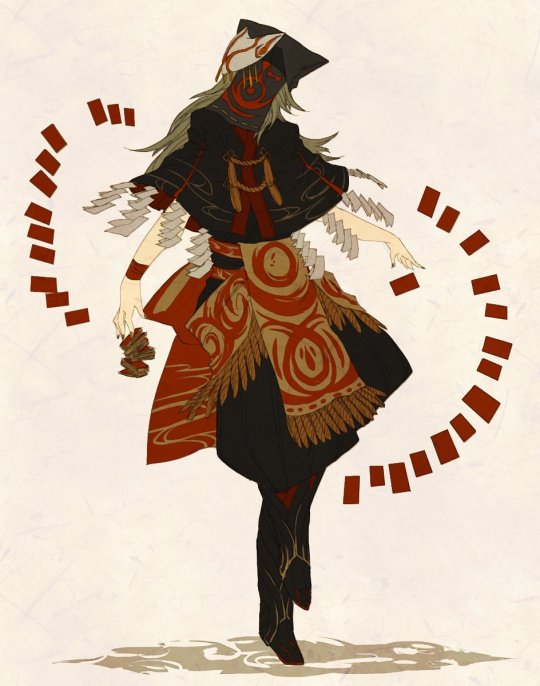
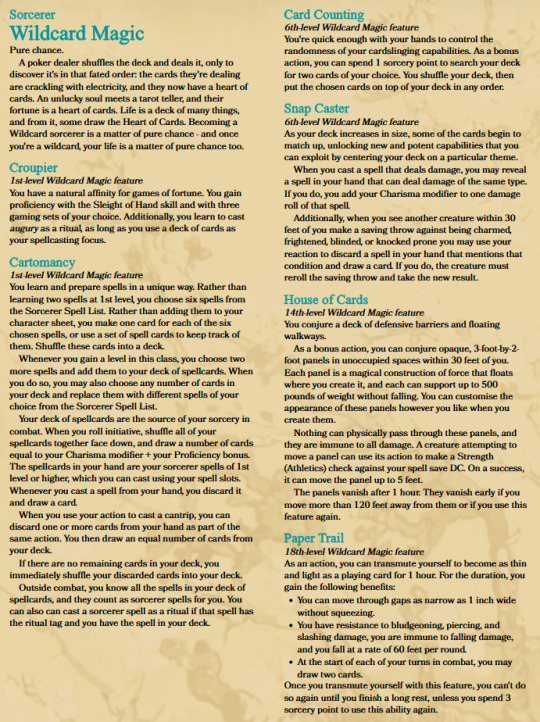
The Wildcard Magic sorcerous origin has a totally unique casting mechanic based round literally drawing your spells at random from a deck of cards. It forces you to act responsively in combat, playing the hand as it's dealt, and planning out your massive deck of spells to exploit the synergies it introduces! Designed to be played with those cool spellcards you can get online for free (or buy).
It's good to be back. See you next week with another.
Would love feedback on this one. Also, have some extensive design thoughts below the break!
Initially I started making this for a Wizard subclass, but I quickly realised the class' concept of a "deck of spells you randomly draw in combat" worked best when it was full of blasting spells. Sorcerers are the "oops! all blasting spells" class - they have fewer choices than the wizard, but they get all the good evocations - much better suited to being chosen at random. Also, the Wildcard is a subclass that has a lot of spells, and therefore a lot of decisions - if I limit the players decisions to only the best options, then the average player will have more fun.
Also, sorcerers generally get very few spell choices. Wizards already have lots of spellchoices - on a wizard, the Cartomancy feature is more like a nerf than a buff. But on a sorcerer, it feels amazing. This feature's unusual limitation is completely unique, and makes combat a whole lot more engaging. And the noncombat abilities you get feel stellar too.
Cartomancy gives you more different spells in combat than the OG sorcerer until around level 9 (Cha+Prof vs Lv+1) after which it starts to act as a real limit. The feature is a massive buff at early levels but then starts to feel weaker. To compensate, 6th level Snap Caster packs a monstrous punch - acting like the beefy 6th level Draconic Bloodline feature, alongside an occasional free metamagic! These are both wrapped up with a deckbuilding requirement- I want people to be encouraged to pick a specific theme, without giving them a hard-and-fast set of rules. Chromatic orb, absorb elements, and chaos orb are all really thematic spells for sorcerers imo, and Snap Caster encourages you to exploit all three.
Sorcerers always get a way to spend sorc points at this point, andat 6th level, the random draw requirement starts to feel more of a limit. Card Counting lets you spend sorc points to stack the cards in your favour. But it still calls for some good planning, and doesn't completely undo the subclass' theme. In playtesting, I found that this feature was pretty necessary at later levels, as a way to mitigate against bad luck.
Almost half of sorcerers get a flying speed at 14th-18th level, and I decided to give this lot "flying speed with a properly thematic twist". House of Cards rounds things out with an absurd capability that lets you trap tiny foes and make bridges through the air with conjured cards
Lastly, Paper Trail finally gives you a way to break the rules of your 1st level feature and draw more cards as the combat goes on. It also gives you damage resistances and the ability to move through gaps. This is very strong, of course, but 18th level is all about giving sorcerers superpowers - and if it can't consistently cast an 8th/9th level spell on the first turn, it's gonna need some epic boosts to keep up with another sorcerer!
#dnd homebrew#dungeons and dragons#dnd#5e homebrew#Luuma's Stuff#homebrew#sorcerer#sorcerer subclass#dnd subclass#wildcard magic
326 notes
·
View notes
Text
Ok, so I am letting you guys. Comment on who do you ship me, Luuma (female Yuuma) with. All characters are included, including the genderbend ones. I will post them up soon. Also, I might make them in Gacha life and post your ships. Just comment who you ship with me and I will do it as soon as I can because I have a lot of stuff to do.

0 notes
Text




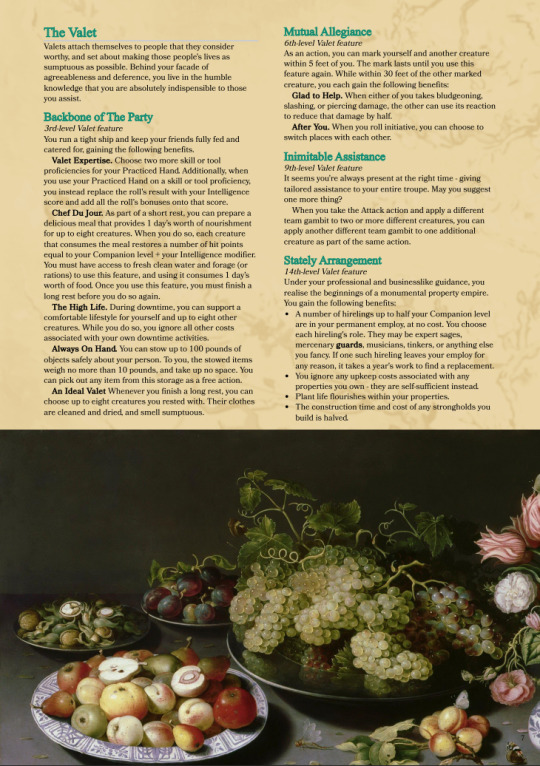
For too long has this class occupied free permanent real estate inside my feeble brain. I wanted to make a new form of nonmagical class, based on the classic character trope of the sidekick, shamefully underrepresented in RPGs. The samwise to their frodo, the puppycat to their bee, the jeeves to their wooster. I've been meddling with this thing since like 2018 or something, and finally it's in a state that I really like!
The core of the class is that you trade your own attacks in to give your allies bursts of alacrity - dashing, disengaging, dodging, grappling, focusing, healing, or even making extra attacks themselves! Then, as long as you haven't attacked, you get to whack a foe once with your bonus action.
The other core of the class is that you're a reliable pal, and great to have around. You've got a knack for reliability, a free second background, and the ability to botch together any piece of adventuring gear from whatever doodads you've got lying around!
Links on the way, and a full text copy of the class below the break.
Warning: 4500 words long!
The Companion
Hastily scrawling down notes, an apprentice mage hurries after her wizard compatriot, frantically trying to beckon her nonplussed friend away from the horrifying monstrosity bearing down on him. Wiping his hands off, a grinning dwarven cook joins in with the fireside discussion as his companions tuck into the delicious breakfast he has prepared. Patting her injured protégé on the shoulder, an ancient dragonborn sensei lifts her young charge to his feet, granting him the reassurance he needs to fight on.
All of these characters are companions, happy to take a back seat from all the heroism and simply keep their compatriots in the best stead they possibly can. Their power lies in hard work, strong bonds, and tactical nouse.
A Helping Hand
The companion represents any kind soul that seeks to devote themselves wholeheartedly to elevating others - and sets their brilliant mind upon perfecting their dutiful care. Doting and maternal, their capabilities stem from a studied understanding of others.
Though they choose to forego the brashness and burliness traditionally associated with heroism, their talent for kindness and tactical nouse makes them an indispensable addition to any team. They can rejuvenate, encourage, and rescue their allies with a few well-placed words and a dusting of spices.
Pulling the Strings
Companions are best able to exploit their prodigious capabilities from the back lines of combat, away from danger, where they can help others administer rapid aid to the fallen, or assist archers in pursuit of their marks. When they fight, they do so best with the simple farm tools of their trade: even though they lack the armaments bestowed upon their martial counterparts, the companion's rustic dedication to self-taught workmanship makes them incomparably consistent with their strikes - more reliable than even the burliest of warriors.
Companion adventurers are dedicated and loyal tacticians, studying their friends closely enough to know when and how to aid and direct them. As they watch their party fumble, bluff and bluster, the companion prefers to smile knowingly, look on affectionately, and stay out of the limelight; aware that if their allies break out into combat, the odds will be squarely in their favor.
The companion might seem a subdued, maternal figure to their fellows, but they are the brains of the operation.
Creating a Companion
As you create your companion character, think about why they chose to help out this specific group of adventurers, and who among the party they consider themselves closest to. The companion is a class of close personal bonds, and bonds should be your foci. Are they the mentor or the mentee? Do they resent their role in the group, and if so, why? What impact does their experience (or, perhaps, lack of it) have on their behavior?
Quick Build
You can make a companion quickly by following these suggestions. First, make Strength or Dexterity your highest ability score, depending on whether you want to focus on melee weapons or on ranged combat (or finesse weapons). Your next highest score should be Intelligence. Second, choose the guild artisan background.
Versatile Score
At your DM's option, you can choose Charisma or Wisdom and use that ability score in place of Intelligence for your Companion features. If you choose Wisdom, your save proficiencies don't change.
##########
Class Features
##########
As a companion, you gain the following class features.
Hit Points
Hit Dice: 1d8 per companion level
Hit Points at 1st Level: 8 + your Constitution modifier
Hit Points at Higher Levels: 1d8 (or 5) + your Constitution modifier per companion level above the 1st Proficiencies
Armor: Light armor, medium armor, shields
Weapons: Simple weapons, war picks, whips
Saving Throws: Intelligence, Wisdom
Skills: Choose two from Animal Handling, Athletics, History, Investigation, Nature and Medicine
Equipment
You start off with the following equipment in addition to the equipment granted by your background:
(a) any two simple melee weapons, (b) a shield, or (c) a war pick (perhaps a hammer, cane, or mattock).
(a) 5 darts, a sling, and 20 bullets, or (b) a whip
(a) leather armor or (b) hide armor
A healer's kit and an explorer's pack.
If you forego this starting equipment, as well as the items offered by your background, you start with 3d4 × 10 gp to buy your equipment.
Multiclassing
If your group uses the optional rule on multiclassing in the Player’s Handbook (p. 163), here’s what you need to know if you choose companion as one of your classes.
Ability Score Minimum. As a multiclass character, you must have at least a Dexterity score of 13 and a Intelligence score of 13 to take a level in this class.
Proficiencies Gained. If companion isn’t your initial class, here are the proficiencies you gain when you take your first level as an companion: light armor, medium armor, shields, simple weapons.
Storied Past
When you choose this class at 1st level, you hark back to the experiences that brought you here.
Choose a second background from the Player's Handbook, in addition to your own. You gain the skill proficiencies, tool proficiencies and languages associated with that background, as well as its associated feature.
Teamwork
Beginning at 1st level, you can use your action to lend a helpful order to your allies - a team gambit. If you’re able to make multiple attacks with the Attack action, you can replace one or more of them with a team gambit.
Choose another creature within 60 feet of you that isn't incapacitated and that you can communicate with. You lend it a burst of alacrity, choosing one team gambit that you know and granting its benefits to the target. A creature can't be affected by the same gambit more than once per turn.
You know two team gambits at 1st level, which you choose from the Team Gambit List. You learn additional gambits as you gain levels in this class, as shown in the Team Gambits Known column of the Companion table. Each time you gain a level in this class, you can replace one gambit you know with a different gambit of your choice from the Team Gambit List.
If a gambit has prerequisites, you must meet them to learn it. You can learn the gambit at the same time that you meet its prerequisites. A level prerequisite refers to your level in this class. Gambits can be used outside combat.
Team Gambit List
Attack Gambit
If the target takes the Attack action on its next turn, it can make one additional attack as part of the same action.
Dodge Gambit
(Prerequesite: 9th level)
You call out incoming attacks against the target. Until the start of your next turn, any attack roll made against the target has disadvantage if you can see the attacker, and the target makes Dexterity saving throws with advantage.
Focus Gambit
(Prerequesite: 5th level)
You provide instruction that helps the target focus its mind. Choose Intelligence, Wisdom or Charisma, and roll 1d4. Until the start of your next turn, the target adds the result to attack rolls, ability checks, and saving throws.
Help Gambit
Once before the end of your next turn, if the target fails an ability check or misses with an attack roll, it can reroll one of the dice once.
Offense Gambit
You bolster the target with a warcry. The next time the target rolls damage before the start of your next turn, it adds your Intelligence modifier to the result.
Reflex Gambit
(Prerequesite: 5th level)
The target focuses on disrupting its foes, and regains the use of its reaction. Until the start of your next turn, hostile creatures within the target's reach provoke opportunity attacks from it whenever they attack a creature other than the target.
Rejuvenating Gambit
You offer a few calming words to the target. It can use its reaction to spend a hit die to heal itself. It rolls the die, adds its Constitution modifier, and regains a number of hit points equal to the total (minimum of 1). Until the start of your next turn, whenever the target makes a Constitution saving throw, it treats a roll of 9 or lower as a 10.
Scout Gambit
The target can immediately use its reaction to move up to its movement without provoking opportunity attacks. If it doesn't move through a hostile creature's reach during this movement, it can take the Hide or Search action as part of the same reaction, gaining a bonus to its check equal to your Intelligence modifier.
Shove Gambit
The target can immediately use its reaction to attempt to grapple or shove a creature within its reach. If it does so, it gains a bonus to its check equal to your Intelligence modifier.
Utility Gambit
(Prerequesite: 5th level)
The target can immediately use its reaction to use an object, draw a weapon, or drink a potion. You can hand the object to them as part of this gambit.
Alternately, you can use this gambit to administer a potion or healer's kit to a creature within 5 feet of you.
Companion's Attack
You follow up your helpful gambits with a swift blow. Beginning at 2nd level, you can make a weapon attack as a bonus action.
You can't use this bonus action on a turn where you use an action to cast a spell, attack a creature, or force another creature to make a saving throw - nor can you use it when you ready such an action.
Practiced Hand
At 2nd level, choose one of your skill or tool proficiencies. When you roll an ability check with the chosen proficiency, you can replace the total with your Intelligence score.
Additionally, choose two types of weapons you are proficient with. When you miss with an attack with that type of weapon, you can replace the attack roll's total with your Intelligence score, potentially turning it into a hit.
Once you use this feature, you can't use it on the same proficiency again until you finish a long rest. You can change your choice of proficiencies or weapons whenever you gain a level in this class.
At 7th level, you choose one more of your proficiencies and two additional weapons you are proficient with to gain the benefits of this feature.
Line of Work
At 3rd level, you choose a line of work that grants you skill in a certain field, as well as a few helpful fighting techniques. Choose a line of work from the Apprentice, Squire, or Valet, all detailed at the end of the class description. The line of work you choose grants you features at 3rd level, and again at 6th, 9th, and 14th level.
Ability Score Improvement
When you reach 4th, 8th, 10th, 12th, 16th, and 19th level, you can increase one ability score of your choice by 2, or you can increase two ability scores of your choice by 1. As normal, you can’t increase an ability score above 20 using this feature.
Bodge Job
Once you reach 4th level in this class, you're never short of materials, and whenever someone seems to be in need of something you can botch it together from bits and bobs pulled out of nowhere.
As an action, you can piece together a functional imitation of a weapon or solid piece of adventuring gear. The object you craft is flimsy, and breaks 1 hour after you create it.
You have a number of uses of this feature equal to your Intelligence modifier, and you regain any expended uses when you finish a long rest.
From 18th level, objects you create last for 24 hours.
Extra Attack
Beginning at 5th level, you can attack twice, instead of once, whenever you take the Attack action on your turn.
Helping Hand
Beginning at 8th level, whenever you help a creature with an ability check, the target can use your bonus to the check in place of its own.
Companion's Command
Beginning at 11th level, you gain great flashes of tactical brilliance that can help your partners to excel in combat.
As an action, you choose another creature within 60 feet of you that you can communicate with. You give the target a rousing command - one it could achieve using its movement and action. For example, you could say "Kellen! Run here and cast wall of fire covering this area between these gnolls" or you could say "Naia! Attack!".
The target can immediately use its reaction to take an extra turn, carrying out any movement or action you described. If something prevents the target from carrying out the command, you choose what it does instead.
On this extra turn, the target can't take bonus actions, and it doesn't regain its reaction.
You have a number of uses of this feature equal to your Intelligence modifier (minimum of one), and you regain all expended uses when you finish a long rest.
Contingency Plans
At 13th level, you're completely prepared for any eventuality, no matter how bizarre or unlucky. If you have disadvantage on an attack roll, ability check, or saving throw, you roll once instead of twice and take the result.
Saving Grace
Once you reach 15th level, you're seldom caught off guard. You can use a bonus action to galvanize a creature with resilience. Choose Dexterity, Constitution, or Wisdom. Until you use this feature again, the target adds 1d4 to its saving throws using the chosen ability score
The Bonds of Friendship
Once you reach 15th level you can offer yourself to the whims of fate to save those closest to you.
When an effect reduces a creature within 60 feet of you to 0 hit points or kills them outright, you can call upon a dazzling burst of devotion that ends all conditions affecting both you and the target and instantly brings you into a location within 5 feet of the target.
The effect is redirected to you, and doesn't affect the target. If you survive it, you fall unconscious at 0 hit points and can't be healed or stabilised by another creature.
Once you use this feature, you can't use it again for 10 days.
Unfailing Companionship
Once you reach 17th level, when you roll initiative and have no uses of Companion's Command left, you regain one use.
Additionally, when you instruct a creature with your Companion's Command, its first weapon attack on its extra turn deals an additional 2d12 damage.
Art of the Bodge
You become an almost supernally competent odd-jobber. You can spend 10 minutes botching together a functional imitation of armor, barding, any drawn vehicle, a rowboat, a keelboat, or any other nonmagical object no larger than a 10-foot cube. The object lasts for 24 hours.
Once you use this feature, you must finish a long rest before you do so again.
Masterclass
At 20th level, you gain a +2 bonus to your proficiency bonus.
Lines of Work
Your line of work is a reflection of your particular skillset - the manner in which you go about supporting your allies.
The Apprentice
You're an ideal assistant to the bookish scholars or magic users. With a plethora of information-gathering tools, battle control spells, and handy familiars and rituals, you become a beloved magical assistant.
Frantic Scribbling- 3rd-level Apprentice feature
You begin noting down the escapades of your group, filling reams upon reams of parchment with scribblings and notes. You have an accurate physical recording of anything you have seen or heard within the past month, including in combat
Spellcasting-3rd-level Apprentice feature
When you choose this line of work, you learn to cast spells through devotion, education, and study. Most apprentices study wizardry, but your DM may allow you to use the Cleric Spell List for this subclass instead, choosing divination and transmutation spells.
Cantrips. You learn three cantrips from the wizard spell list. You learn an additional cantrip once you reach 10th level in this class.
Spell Slots. The Apprentice Spellcasting table shows how many spell slots you have to cast your spells of 1st level and higher. To cast one of these spells, you must expend a slot of the spell's level or higher. You regain all expended spell slots when you finish a long rest.
For example. if you know the 1st level spell find familiar and have a 1st level and a 2nd level spell slot available, you can cast find familiar using either slot.
Spells Known of 1st-Level and Higher. You know three 1st level wizard spells of your choice, two of which you must choose from the conjuration and divination spells on the Wizard Spell List.
The Spells Known column of the Apprentice Spellcasting table shows when you learn more wizard spells of 1st level or higher. Each of these spells must be conjuration or divination spells of your choice, and must be of a level for which you have spell slots. For instance, when you reach 7th level in this class, you can learn one new spell of 1st or 2nd level.
The spells you learn at 8th, 14th, and 20th level can come from any school of magic.
Whenever you gain a level in this class, you can replace one of the spells you know with another spell of your choice from the Wizard spell list. The new spell must be of a level for which you have spell slots. and it must be a divination or evocation spell, unless you're replacing the spell you gained at 8th, 14th, or 20th level.
Spellcasting Ability. Intelligence is your spellcasting ability for any spells you learn using this feature, since you employ memorization to learn your spells.
You use your Intelligence whenever a spell refers to your spellcasting ability. In addition, you use your Intelligence modifier when setting the saving throw DC for a spell you cast with this feature, and when making a spell attack roll.
Spell Save DC = 8 + your proficiency bonus +
your Intelligence modifier
Spell attack modifier = your proficiency bonus +
your Intelligence modifier
Ritual Casting. You can cast any wizard spell you know as a ritual if that spell has the ritual tag.
Apprentice Spellcasting
Apprentice Level/Cantrips known/Spells Known/1st/2nd/3rd/4th
2nd 3 3 2 –– –– ––
3rd 3 3 2 –– –– ––
4th 3 4 3 –– –– ––
5th 3 4 3 –– –– ––
6th 3 4 3 –– –– ––
7th 3 5 4 2 –– ––
8th 3 6 4 2 –– ––
9th 3 6 4 2 –– ––
10th 4 7 4 3 –– ––
11th 4 8 4 3 –– ––
12th 4 8 4 3 –– ––
13th 4 9 4 3 2 ––
14th 4 10 4 3 2 ––
15th 4 10 4 3 2 ––
16th 4 11 4 3 3 ––
17th 4 11 4 3 3 ––
18th 4 11 4 3 3 ––
19th 4 12 4 3 3 1
20th 4 13 4 3 3 1
Battle Magic-6th-level Apprentice feature
While you aren't wearing heavy armor or wielding a shield, you can use your Companion's Attack on any turn when you use your action to cast a spell.
Spell Swapping-6th-level Apprentice feature
Once per day, at the end of a short or long rest, you can spend 1 minute helping an ally swap the spells they can cast. The creature you help may choose a new list of prepared spells as if it had just finished a long rest. Alternately, if it knows spells, it can choose one of the spells it knows of 1st level or higher and replace it with another spell from that class's spell list. The new spell must be of a level that they can learn.
Apprenticeship-9th-level Apprentice feature
You can study spellcasters rapidly enough that you can roughly imitate their spells. Whenever you see a friendly creature within 60 feet of you cast a spell of a level for which you have spell slots, you can use your reaction to learn a copy of that spell. For the next minute, you can cast the spell using your spell slots.
Once you cast a spell with this feature, you can't use this feature again until you finish a long rest.
Magical Gambit-14th-level Apprentice feature
As a masterful magician, you gain the following unique team gambit. It doesn't count against your number of gambits known. You may only use it once per turn.
Cast A Spell.
The target can immediately use its reaction to cast a 1st-level spell with a casting time of 1 action or 1 bonus action using its spell slots.
The Squire Line Of Work
You are a gallant companion to one of the martial folk in your group, working to aid them and eager to acquire or share any fighting know-how you can. You might be training beneath them, or, on the contrary, they could be your protégé themselves.
Bonus Proficiencies-3rd-level Squire feature
When you choose this line of work, you gain proficiency with heavy armor and martial weapons.
Call to Arms-3rd-level Squire feature
You can rally your allies with an encouraging cry. As a bonus action on your turn, you may choose a friendly creature within 60 feet of you that you can communicate with. Until the start of your next turn, the target gains a bonus to AC equal to your Intelligence modifier, and it has advantage on attack rolls.
You have a number of uses of this feature equal to your Proficiency bonus, and you regain any expended uses when you finish a long rest.
Fighting Style-6th-level Squire feature
You adopt a particular style of fighting as your specialty. Choose one of the following options. You can't take a Fighting Style option more than once, even if you later get to choose again.
Dueling. When you are wielding a melee weapon in one hand and no other weapons, you gain a +2 bonus to damage rolls with that weapon.
Defense. While you are wearing armor, you gain a +1 bonus to AC.
Interception.
When a creature you can see hits a target, other than you, within 5 feet of you with an attack, you can use your reaction to reduce the damage the target takes by 1d10 + your proficiency bonus (to a minimum of 0 damage). You must be wielding a shield or a simple or martial weapon to use this reaction.
Protection.
When a creature you can see attacks a target other than you that is within 5 feet of you, you can use your reaction to impose disadvantage on the attack roll. You must be wielding a shield.
Warhorse Trainer-9th-level Squire feature
By spending 8 hours tending to a beast with an Intelligence score of 3 or lower, and pampering and feeding it, you can train it to accept a rider and act as a controlled mount in combat. Your DM determines if a beast will accept this training, and whether they have appropriate anatomy to serve as a mount once trained.
Additionally, when you take the Attack action, you can choose a beast trained as a mount within 60 feet of you, and give it a team gambit as part of the same action.
Banner Bearer-14th-level Squire feature
You craft a banner that has a crest you associate with yourself or your close friends. The banner has an AC of 18 and a number of hit points equal to thrice your Companion level. If the banner is destroyed or damaged, you can spend 10 minutes repairing it as part of a short or long rest to restore all its missing hit points.
Any creature can wield the banner in a free hand, mount it on their back, or plant it in the ground. The banner inspires creatures that are friendly to you within a 15-foot sphere centered on it. Such creatures can't be frightened, grappled, or knocked prone.
The Valet Line of Work
Valets attach themselves to people that they consider worthy, and set about making those people's lives as sumptuous as possible. Behind your facade of agreeableness and deference, you live in the humble knowledge that you are absolutely indispensible to those you assist.
Backbone of The Party-3rd-level Valet feature
You run a tight ship and keep your friends fully fed and catered for, gaining the following benefits.
1: Valet Expertise. Choose two more skill or tool proficiencies for your Practiced Hand.Additionally, when you use your Practiced Hand on a skill or tool proficiency, you instead replace the roll's result with your Intelligence score and add all the roll's bonuses onto that score.
2: Chef Du Jour. As part of a short rest, you can prepare a delicious meal that provides 1 day’s worth of nourishment for up to eight creatures. When you do so, each creature that consumes the meal restores a number of hit points equal to your Companion level + your Intelligence modifier. You must have access to fresh clean water and forage (or rations) to use this feature, and using it consumes 1 day’s worth of food. Once you use this feature, you must finish a long rest before you do so again.
3: The High Life. During downtime, you can support a comfortable lifestyle for yourself and up to eight other creatures. While you do so, you ignore all other costs associated with your own downtime activities.
4: Always On Hand. You can stow up to 100 pounds of objects safely about your person. To you, the stowed items weigh no more than 10 pounds, and take up no space. You can pick out any item from this storage as a free action.
5:An Ideal Valet
Whenever you finish a long rest, you can choose up to eight creatures you rested with. Their clothes are cleaned and dried, and smell sumptuous.
Mutual Allegiance-6th-level Valet feature
As an action, you can mark yourself and another creature within 5 feet of you. The mark lasts until you use this feature again.
While within 30 feet of the other marked creature, you each gain the following benefits:
Glad to Help. When either of you takes bludgeoning, slashing, or piercing damage, the other can use its reaction to reduce that damage by half.
After You. When you roll initiative, you can choose to switch places with each other.
Inimitable Assistance
*9th-level Valet feature
It seems you're always present at the right time - giving tailored assistance to your entire troupe. May you suggest one more thing?
When you take the Attack action and apply a different team gambit to two or more different creatures, you can apply another different team gambit to one additional creature as part of the same action.
Stately Arrangement-14th-level Valet feature
Under your professional and businesslike guidance, you realise the beginnings of a monumental property empire. You gain the following benefits:
A number of hirelings up to half your Companion level are in your permanent employ, at no cost. You choose each hireling's role. They may be expert sages, mercenary guards, musicians, tinkers, or anything else you fancy. If one such hireling leaves your employ for any reason, it takes a year's work to find a replacement.
You ignore any upkeep costs associated with any properties you own.
Plant life flourishes within your properties.
The construction time and cost of any strongholds you build is halved.
#dnd#dnd homebrew#dungeons and dragons#homebrew#luuma's stuff#5e homebrew#subclass#homebrew class#dnd character#dnd5e#the companion#companion class#ttrpg oc#ttrpg design#links on the way#I think I will also put this onto dmsguild at which point I may have to take it down#but for now enjoy this i love you
73 notes
·
View notes
Text

The wand of wordle is a neat twist on an old favorite homebrew item - a mystical onomantic object that lets you replace one letter from a spell you know.
Everyone in my campaign is an incredible player, i love them, and I have written them the ability to mess my shit up.
#Add this to your campaign i dare you#Spoilers but only for Beth if she dares to show Jamie#nd also for charlotte if she sees this#dungeons and dragons#dnd#dnd homebrew#dnd item#luuma's stuff#homebrew item
67 notes
·
View notes
Text
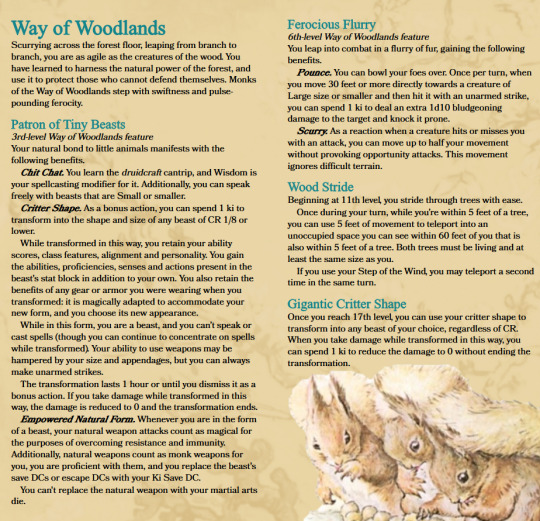
Hey gang,
I'm back to my usual setup now lmaooo. Here's a sweet little monk subclass designed for multiclassing moon druid, acting out redwall, or being master cricket from kung fu panda.
#did you know that if you accidentally fumble a headphone jack into a usb port#it short circuits the motherboard and kills your PC instantly?#bummer right! I have learned many new and exciting facts these past few weeks away from tumblr#dnd monk#dnd#dnd subclass#dnd 5e#dnd homebrew#homebrew subclass#luuma's stuff#5e homebrew#subclass#dungeons and dragons
55 notes
·
View notes
Text

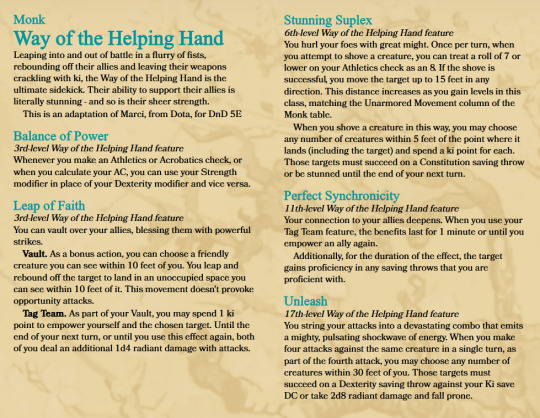
Time for a proper fistfighter
The Way of the Helping Hand is an unthinkably strong subclass based off Marci (a fan fave from Dota 2) that's designed to replicate every aspect of her kit. She's a strength-based, brawly support that hands out an incredible buff to her allies, and escapes combat by bounding straight off them. Also she can throw someone like literally 15 feet, with no issue. I imagine you can see why Marci is a fan favorite
#next week#dnd#dnd homebrew#monk#dnd monk#luuma's stuff#subclass#monk subclass#dota 2#marci#dota 2 anime#dnd subclass#homebrew subclass#shoutout to me for saying i will post things and then posting those things two weeks later Alas You Know How It Be#Love you all very much
56 notes
·
View notes
Text

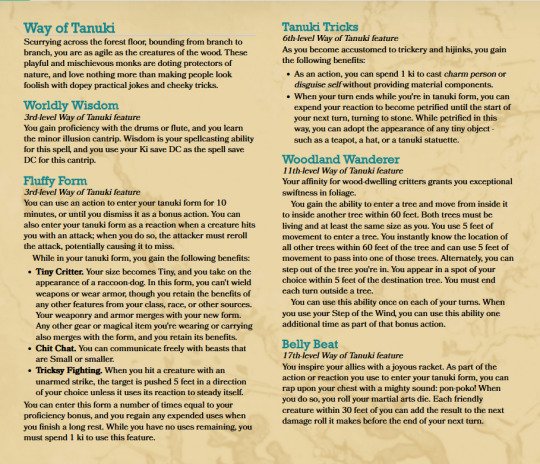
Tanuki monk! Become a tiny, cheeky critter and harass your foes with an array of illusions! Turn into a statue constantly to clown on anyone who attacks you! Shove enemies 20 feet in a turn just to bother them! Play drums at 1 in the morning!
I made this out of another old monk subclass over lunch and I couldn't be happer with how it fitted together. The amount of dumb stuff you can do with this is very high, and I hope that lives up to their wonderful folklore inspiration.
#Hell yeah I like doing monk subclasses#dnd monk#luuma's stuff#homebrew#dnd stuff#subclass#dungeons and dragons#dnd homebrew#D&D#dnd5e#dnd
28 notes
·
View notes
Text
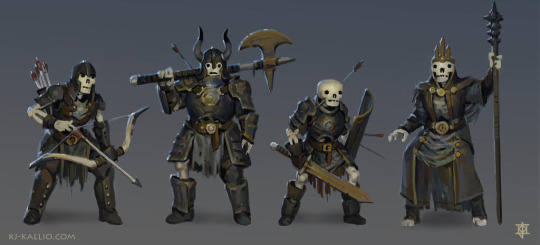
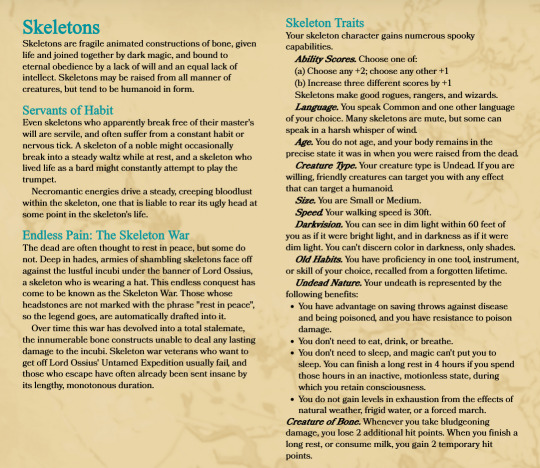
Art by KJKallo. If it ever becomes possible to play as a skeleton, I think they should be flimsy, tireless, and reliable: a sentinel that keeps watch for the party but can often get bonked down in combat. Here's a crack at it - with an entire lore section based off a wint tweet lmao
#dnd homebrew#dungeons and dragons#dnd#5e homebrew#Luuma's Stuff#DnD rogue#dnd stuff#homebrew subclass#dnd races#skeleton#homebrew race
259 notes
·
View notes
Text
hell yeah
goose time


#i forgot I had made this and I am overjoyed to find it again#he is awful i love him#it plays exactly like the goose game boy#stealing items and running away like an absolute madman#dnd homebrew#dungeons and dragons#dnd#5e homebrew#Luuma's Stuff#absolute chaos#untitled goose game#d&d#dnd monster
245 notes
·
View notes
Text
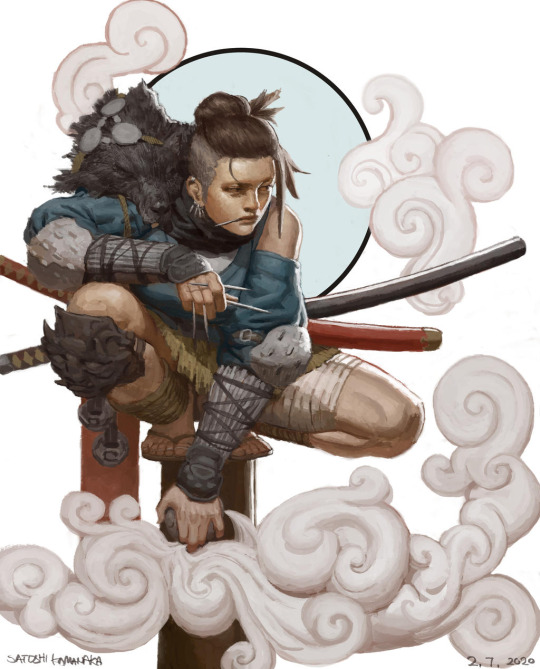

(Art by S. Kamanaka) There's a survey on feats from the player's handbook, and that's got me thinking about Skulker - a feat that basically lets you circumvent three rules that commonly get forgotten anyway. Unless your DM is particularly precise about hiding, it doesn't offer a whole lot.
I wanted to take that concept (feat for doing sneaky moves) and make its benefits more concrete - because the concept is fab! Especially for that new blindfighting style. So, here's the result - an arsenal of smoke grenades for distracting and disengaging, and some extra benefits against foes that would otherwise spot you.
Feats are fun, so if you guys have any feedback, or any suggestions for feats you want to see reworked, let me know. Have a great day ;)
#dnd homebrew#dungeons and dragons#dnd#5e homebrew#Luuma's Stuff#DnD rogue#homebrew feat#dnd feat#dnd stuff
168 notes
·
View notes
Text
Altered Emerald is my labour of love - a somewhat-popular mod of the original Emerald game, for GBA.
I've been tinkering with it since June 2013, and just recently I wrapped up with one last patch. It's a nostalgia trip through Pokémon Emerald, with access to all 386 mons (and their gen 4 evos) alongside all the moves and abilities up to gen 6 and 7!

I've also updated the routes, and added about ten more (with a massive island accessible from route 109). Also Nature Power works in place of all HMs, there's an EV checker, a nature swapper, contests, an ability that makes the type chart invert, and more.


I am a massive nerd about this game. It's free, and you can get the .ips file here: Altered Emerald 4.2.
The download contains an .ips file. You can make an Altered Emerald using Lunar IPS, clicking "Apply IPS Patch", and applying the IPS file to a clean Emerald rom. You can play that patched rom with VBA-M.
Remember to obtain this Rom legally, and not through an illegal download like the one at emulatorgames.
#More DnD content on the way#But also I love this game and I must tell you about it#pokemon#romhacking#rom hack#luuma's stuff#altered emerald#pokemon emerald
93 notes
·
View notes
Text


Art by Guillem Ferrer
No city, however great, will ever stop weeds growing in its pavements. The Circle of Cybernetics is perfectly at home in a high tech environment - It's designed as a healthy update to the druid subclass from the Modern Magic UA, keeping wire walk and replacing all of the other features with new cyberpunk-themed goodies.
#subclass#dnd homebrew#dungeons and dragons#dnd#5e homebrew#Luuma's Stuff#druid#dnd druid#druid subclass#i am quite tempted to put out a bunch of reworks for old UA content#E.g strixhaven#who knows how that's gonna go lol! but we'll see#Juiced Up Old Content January#it is nearing the end of february in juiced up content january. let's see if I can get to april without changing the tag lmao
116 notes
·
View notes
Text

An adaptable, fighter-exclusive fighting style that I quite like - I think it'll transforms how your party uses weapons. This started out as a style for "versatile weapon" users and morphed into something even more versatile! Make Light rapiers for two-weapon fighters! A finesse longsword! A long-reaching quarterstaff for monks! Throw a war pick at a mind flayer! And many other inadvisable possibilities
#dnd homebrew#dungeons and dragons#dnd#5e homebrew#Luuma's Stuff#fighter#homebrew#dnd fighter#fighting style#juiced up old content january#except its not old content and its not january#202 posts! whoa
84 notes
·
View notes
Text
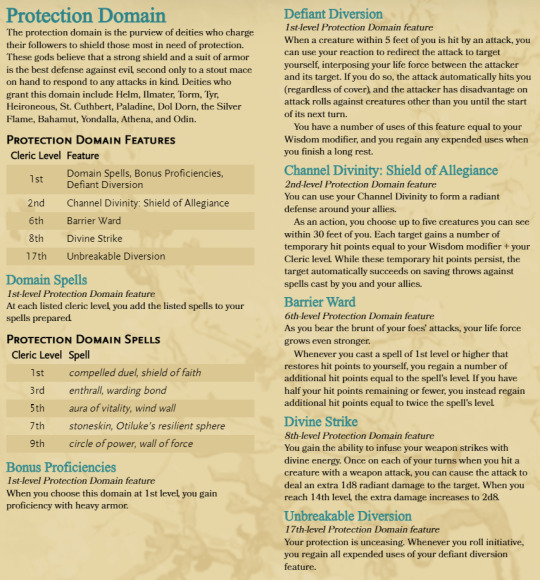

About a year ago, I saw someone saying they wanted to play a pure tank class that was built exclusively for protecting all their pals from harm. so I made one for them!
This was really only a couple hours work, but it comes out as a rock solid cleric that can force foes to focus them. That ability turns cleric into a tank's dream come true.
#subclass#dnd homebrew#dungeons and dragons#dnd#5e homebrew#Luuma's Stuff#Juiced Up Old Content January#DnD Cleric#Cleric
113 notes
·
View notes
Text

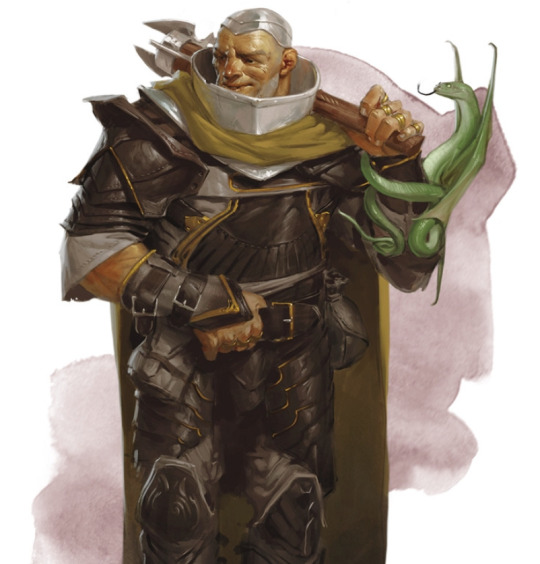
A grappler subclass for Rogues! It was initially built for villains, brutes and bullies, but it works just as well for a brawny protector that pins down dangerous foes with Athletics expertise to tank for the team using uncanny dodge. Perfect for villainous NPCs, and a riot to play.
#dnd homebrew#dungeons and dragons#dnd#5e homebrew#Luuma's Stuff#DnD rogue#dnd stuff#homebrew subclass#subclass#dnd subclass
84 notes
·
View notes
Text

Heirloom Sorcerers are a martial sorcerer, born as the heir to a mighty magic weapon that drinks from their wellspring of power. I have spent longer on this subclass than I'd like to admit. It's a tough one to balance, but luckily Sorcerers have plenty of room for power in their subclasses.
#subclass#dnd homebrew#dungeons and dragons#dnd#5e homebrew#Luuma's Stuff#Juiced Up Old Content January#Sorcerer subclass#dnd sorcerer#sorcerer#also the entire thing of like just being magically rich? ew. but thats a flaw with all sorcerers. is an uninteresting trope#alas they're just born special like x ae-a x-11#aaaalso ive spent way too long trying to balance this guy i swear lmao#enjoy <3
77 notes
·
View notes